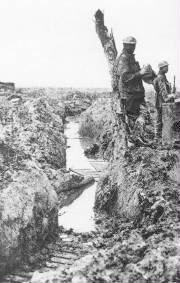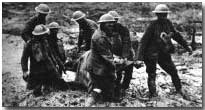|
1917: Passchendaele

The battle of Passchendaele began at 03:50 on July 31, 1917, with a huge barrage of Allied
artillery. The bombardment made use of 3,000 guns which expended four and a quarter
million shells. This offensive both warned the Germans of the coming attack but it also turned the battlefield
into a mess of craters. With unusually heavy rains, the entire area was transformed into a sea of mud. The soldiers slept
in the mud, crawled in the mud, fought in the mud, and drowned in the mud. The mud also clogged rifles, ruined food, and rendered
artillery useless. The battle slogged on for months with neither side making progress due to the inhospitable conditions.
In the face of these horrible circumstances Canadian soldiers performed exceptionally and, in the end, were instrumental in
securing victory. Through the 3 months of fighting the Canadians established themselves as an elite fighting Corp and received
honours reflecting that. In the end, 9 soldiers received the Victoria Cross in recognition of their outstanding effort at
Passchendaele.
“the blindest slaughter of a blind war” that was the battle of Passchendaele brought the final human cost of
the conflict in Flanders to six hundred thousand killed and one and a half million wounded. But ultimately, when the
heap of rubble that had once been the town of Passchendaele was eventually captured by the allies on the 7th November 1917,
it was occupied for a few hours, then the troops were withdrawn. General Haig reported that “the campaign had
served its purpose." The salient had been re-widened by several kilometres.

 |
 |
|
Memorial Tablet
(November 1918)
Squire nagged and bullied till I went to fight,
(Under Lord Derby's scheme).
I died in hell -
(They called it Passchendaele). My wound was slight,
And I was hobbling back; and then a shell
Burst
slick upon the duck-boards; so I fell
Into the bottomless mud, and lost the light.
At sermon-time, while Squire is in his pew,
He gives my gilded name a thoughtful stare;
For,
though low down upon the list, I'm there;
"In proud and glorious memory" ... that's my due.
Two bleeding years
I fought in France, for Squire:
I suffered anguish that he's never guessed.
Once I came home on leave: and then went
west ...
What greater glory could a man desire?
Siegfried Sassoon 1886 - 1967
|
|
 |
 |
![Passchendaele [click for larger image]](sitebuildercontent/sitebuilderpictures/passchendaele3.jpg)
 |
 |
|
This Song For You
(1975)
Hello darling, this is the army,
I've just got the time to write,
Today we attack, there's no turning
back,
the boys they're all ready for the fight.
Yes, I'm well but this place is like hell,
they call it Passchendaele,
In nineteen seventeen the war
must be ending,
the General said this attach will not fail;
So I'm writing down this little melody
When you play it my love, think of me...
We'll be together in
this song for you,
And it goes Lalala...sing it darling...Lalala...
They got old Bill and the Sergeant is still out there
Wounded in some shellhole,
They say this war will
end all wars,
Oh God I really hope it will,
Oh how's old England, are they still singing
those songs that we loved to sing,
When all this is over,
we'll go sailing in Dover,
catching fish like we used to with a string,
Oh I miss you, I miss you, I miss you so,
If they get me my love you will know...
We'll always be together
in this song for you...
And it goes Lalala...I have to go now...
take care of yourself my love.
|
|
|
|
 |
 |
![Passchendaele [click for larger image]](sitebuildercontent/sitebuilderpictures/passchendaele4.jpg)
|
 |
|
|
 |
 |
 |
|
 |
 |
|
|
|
|
|
"a passionate tour de force of
unaccompanied singing as you
Inspired. Barbed lyrics, a wide
pitch range and thrilling bass
sonorities swapped between
all three. If there is such a thing
as postmodern folk music, this
otherwise known as the
Third Battle of Ypres,
was one of the major battles of
World War I fought by British, ANZAC,
and Canadian soldiers against the
German army near Ypres
(Ieper in Flemish) in West Flanders,
southwestern Belgium over the control
of the village of Passchendaele.
The plan was to drive a hole in the
German lines and advance clear
through to the Belgian coast.
to build a personal archive of
thousands of files which may
be researched at the
Memorial Museum
Passchendaele 1917
we will only create a file if
a photograph is available and
only if the man concerned lost
his life between 12th, July and
15th, November, 1917.
exploring the rich variety of
traditional music found in Europe
today. Its members come from
highly diverse musical backgrounds
- including jazz, classical, music for
theatre, traditional music, folk and
chanson - and offer us one of the most
audaciously original projects to
emerge in the last few years
Panta Rhei
Coope, Boyes and Simpson
In 1997,
to mark the eightieth anniversary
the
people of Passendale invited
Coope
Boyes & Simpson and the
Brussels-based
octet, Panta Rhei
to create
Passchendaele Suite, a
cycle of
songs and music which was
first performed
in the town’s
main square
and later in front of
an audience
of more than fourteen
thousand
on the Main Stage at the
Dranouter
Folk Festival. Using specially
written,
contemporary and traditional music,
the
Suite adds new perspectives to the
tragedy
of the Great War. Lost dreams
of the New
Zealand troops who came
half across
the world, the Irish poet
who
wrote of hillside farms and birdsong
amid the
carnage of the trenches, fragments
of older
battles fought on the
Bloody Field
of Flanders and above all
-accompanied
or in haunting acappella
-
stories of those who survived but were
never the
same or were laid
low
never to be hurt again.
"The experience of the
1914-1918 Great War left
a lasting mark on the youth
of Canada. Over the years
however, that experience has
been generalized and
sanitized in history books
so that long-ago events in
distant countries no longer
seem real. The authentic
voices of those who actually
served and experienced the
horror of war are now seldom heard."
|
|
 |
 |
|
|
 |
 |
 |
|
|
|

